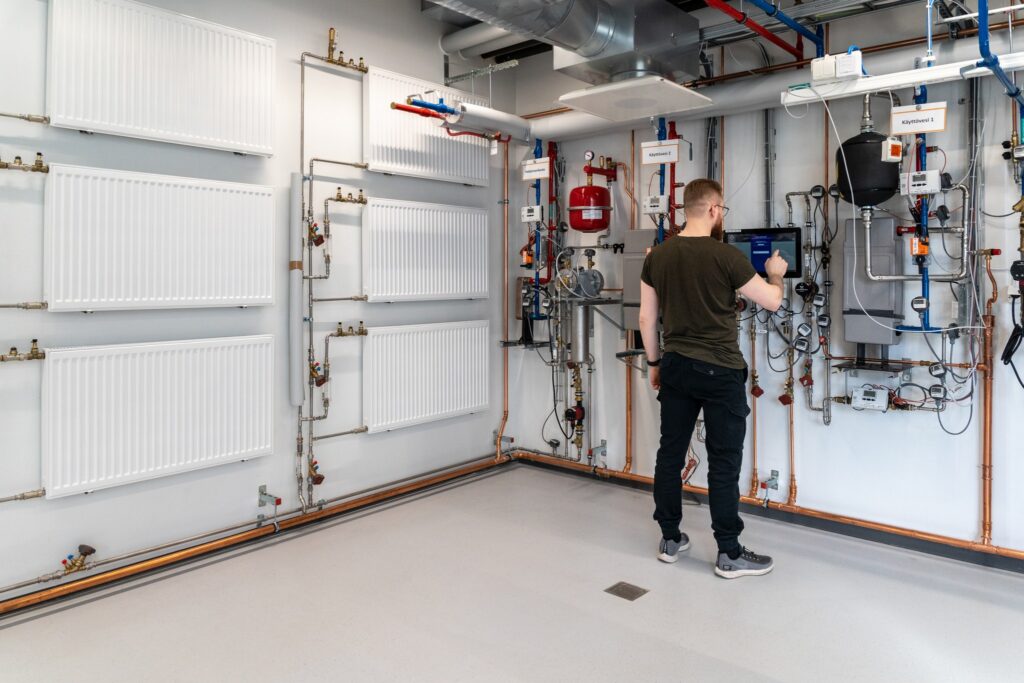
ELVIS – Continuous learning in higher education institutions in the fields of energy, electrical, and building technology
1 January 2021 - 31 October 2023
Engineering and Engineering Trades


Objectives
The objective is to address the skills gap in the energy, electrical, and building technology sectors by providing additional and supplementary education that meets the needs of the working life. Learning environments are designed to be completed in the most suitable way from the user’s perspective. Options include conducting laboratory work either on-site in a hybrid laboratory, remotely utilizing remote management systems, or as simulation laboratories. In simulation laboratories, digital twins of learning environments are used to simulate real-life conditions.
Project Implementation
The project maps out the needs of the working life for additional and supplementary education in the energy, building technology, and electrical sectors. Based on this mapping, training packages are developed at the Linnanmaa campus’s hybrid laboratory, where education takes place regardless of time and place.
The project is implemented in collaboration with experts from Oamk’s energy, building technology, and electrical departments, as well as with the University of Oulu, which provides expertise in the implementation of simulation laboratories.
Actions
Work Package 1. Defining skills needs with micro and small businesses
This work package specifies the skills needs for additional education in the energy, building technology, and electrical sectors. Training packages are tailored based on the needs of the working life. The aim is to quickly respond to the skills shortage in the aforementioned sectors. In this work package, physical learning environments and simulation models of the hybrid laboratory are presented to industry companies, and the required training packages and teaching methods are specified. Dialogue on the training needs of the working life continues throughout the project, deepening cooperation between educational institutions and the business sector. Training packages are tailored to the common needs in areas supporting the growth of micro and small businesses.
Work Package 2. Pedagogical models for the hybrid laboratory
In this work package, three types of laboratories are implemented in the hybrid laboratory: 1) on-site, 2) remote, and 3) simulation laboratories. The work package is carried out in collaboration with experts from Oamk’s energy, building technology, and electrical departments. The University of Oulu provides expertise in implementing simulation laboratories.
Work Package 3. Piloting, evaluation, and development of training
In this work package, pedagogical models tailored to the needs of the working life are compiled into training packages that enable individual learning paths, and they are tested during the project, with representatives of the target group participating. Written feedback is collected from participants regarding both the content of the training and pedagogical solutions. Content, teaching methods, and learning paths are developed based on the feedback received. Training courses that meet the needs of the working life and are based on selected pedagogical models are implemented and documented. The planned pedagogical models are implemented in a way that enables flexible and cost-effective supplementary education without being tied to a specific time or place. Target groups can participate in training courses on a day, evening, or weekend basis.
Work Package 4. Communication and events
The aim of this work package is to make the hybrid laboratory and its supplementary education opportunities known and accessible to all. The message is that the hybrid laboratory is a leading center for lifelong learning in its field due to its high technology and the modern, comprehensive, time- and place-independent learning environments and pedagogical models implemented in this project.
Work Package 5. Administration
The administration of the project is carried out in accordance with the instructions of the funder.
Project Funding and Implementers
The project is coordinated by Oulu University of Applied Sciences and implemented in collaboration with the University of Oulu. The responsible department at Oulu University of Applied Sciences is the Department of Construction, Energy, and Building Technology. The project is funded by the European Social Fund. The funding has been granted by the Centre for Economic Development, Transport and the Environment for Northern Ostrobothnia.